Atheists Do It Guilt-Free
Speaking of rapture: “Atheists have far better sex lives than religious people who are plagued with guilt during intercourse and for weeks afterwards, researchers have found…. Strict religions such as Mormons ranked highest on the scale of sexual guilt. Their average score was 8.19 out of 10. They were followed closely behind by Jehovah’s Witness, Pentecostal, Seventh Day Adventist, and Baptist. Catholics rated their levels of sexual guilt at 6.34 while Lutherans came slightly lower at 5.88 . In contrast, atheists and agnostics ranked at 4.71 and 4.81 respectively.”
United Airlines' Real Life Contextual Advertising Nightmare
Rough week for United: “A United Airlines ad across the street from ground zero that read ‘You’re going to like where we land’ has been removed after NBC New York reported that some found it inappropriate…. The debate comes a day after United — which is in the midst of a merger with Continental Airlines — apologized for reusing the flight numbers of two hijacked planes used in the 9/11 attacks. Flight numbers 93 and 175 were mistakenly assigned to two flights by Continental Airlines.”
A Q. & A. With Bootsy Collins, American Hero
A Q. & A. With Bootsy Collins, American Hero
by Stephen Reader
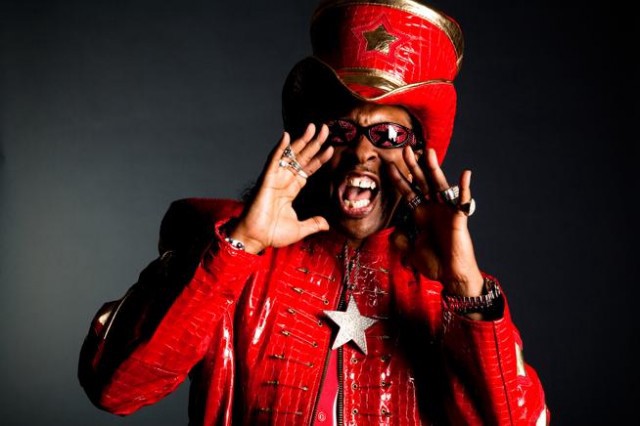
Bootsy Collins has one of the most impressive resumes in popular music, beginning his career as a bassist with the one-two punch of James Brown and Parliament Funkadelic. More than 40 years after being plucked from obscurity to back up the Godfather of Soul, his new album, The Funk Capitol of the World, seeks to put his life and funk in a historical perspective. Among other things, the death of his brother Phelps “Catfish” Collins compelled him to craft a “musical biography” that would preserve the memory of the people who were most influential to Bootsy: everyone from Catfish to Al Sharpton to Jimi Hendrix and, of course, George Clinton. Bootsy was kind enough to conduct this interview over the phone from Culver City, California.
This record’s your first in five years, and the one before that was a Christmas album. What finally got you getting it done again?
I’d been recording a lot of this album for years. I’m so used to recording stuff that comes to me, not for any particular reason or album, but it felt like something was ready to jump off. I didn’t know who it was going to be with; I just needed it to be with someone who trusted me with what I wanted to do, someone who would allow me to go to Vegas on my record, to experiment and gamble and roll the dice, to allow me to have creative control to do what I want to do, play what I want to play. Mascot Records allowed me to do that, and when they agreed to let me do that, that’s when I started stockpiling the tracks and figuring out the concept of what I wanted this album to be about.
What was that concept?
It’s my musical biography. More about where I got my funk from, as opposed to me and my funk. Like, who inspired me, what did I grow up listening to. I give tribute to certain people who helped guide my whole life, not just musically, but in all areas. That’s what this record represents: the era I came up in, and also the voices that I used to hear when I was comin’ up. Real voices, people speakin’ real stuff. I had to go outside of the music world and artistry; I had to get people that just had voices, and they didn’t have to do with music. I wanted great music and the message to be strong; spreading hope like dope, you know? That, I think, is what we achieved, and it just feels good.
Tell me about those non-musical voices.
Well, Samuel L. Jackson, I was so fortunate to work with him a couple years ago. We’ve always talked about doing something together and we were working on this Tiger Woods commercial. I had done the music and I was talking through [Jackson’s] narration with him, and I was actually working on my record then so it was pretty easy to just ask him, well, how about I got this track and this idea, and he was interested so I set the studio up. Samuel came by one morning and we knocked it out. I turned the track on and he just started rapping. It was all about how did music affect him coming up, how it helped him get to the silver screen.
Dr. Cornel West, I wanted him to do this song called “Freedumb,” to which he said, “Well, what do you want me to talk about?” I said, this is the concept, we got all these smart phones and we’re still making all these dumb decisions. He said, “Hold that thought, where’s the microphone?” He jumped immediately up and said turn the tape on, didn’t write nothing down, it was all off the top of his head. That’s the way we used to do it: just walk in the studio and record like that. It was amazing
What was going on in your life that made you decide now was the time to do this biography?
I was losing so many of my friends, my family members, and I started realizing how easy it is for the whole program, the whole era, to get lost if I don’t step up and say something, and do something, put it down so future generations will know about the era I came up in. It’s important for us as Americans. It’s our history. We tend to kind of throw it all away, but I wanted to at least document it, where we came from.
Oh, you think you’re the only intelligence in this universe? We’re probably just like the ants, or not as good: we don’t know how smart they are ’cause we’re so busy talking about how smart we are.
When you were playing with P-Funk, who were you looking backwards at?
Well, we weren’t actually looking backwards. It was more like we were looking forward to going back. We were a part of that whole groovement. We were comin’ up out of the hippie, the acid, the whole LSD thing, and we thought, how do we make this whole thing cool for a brother? Because back in the day, the word “funk” wasn’t even cool. Being black wasn’t cool. We had to evolve into these things. It wasn’t lookin’ back; it was more like takin’ what we had and moving forward, making it cool and hip. There were certain things brothers wouldn’t do with chicks, or didn’t want you to know they did with chicks, that we made cool. Funk became a cool word, and it was cool to be funky, cool to be black. We were a part of making that cool happen.
Taking it forward into the future, this whole alien persona mothership connection, it seems like you connected that idea of being black with being from a completely different place.
And we are. We considered ourselves space pimps. We were from outer space and we were proud of it. Oh, you think you’re the only intelligence in this universe? We’re probably just like the ants, or not as good: we don’t know how smart they are ’cause we’re so busy talking about how smart we are. If you have to continue to tell someone how smart you are, that’s kinda bein’ dumb. That’s where “Freedumb” comes in at. We’re making computers smarter than we are. We can’t keep up with them, when we are the best computers that has been made today.
I said that thing about Cornel West and Samuel L. Jackson and how they came in and didn’t write their lyrics. We’ve gotten to a place where it’s so comfortable to write stuff down and prerecord something, an idea of something. We get hooked on that and we lose our memory without recognizing it, taking the easy way out. It’s not wrong, it’s just a natural thing about us. That’s the way we were made. It goes to show me, when I saw [those guys] doing this, it was like, man, I used to do this and didn’t even think about it. Now, you have to write all this stuff down.
The way you talk about it, sounds like thinking is a lot less important to you than feeling.
Back in day, when I first started gettin’ going on playing bass and standin’ in front of an audience and singing, it was so natural for me that I never even thought about the fact that I’m playing bass and singing. I never thought about it.
Then I took off for about three years, when I was trying to figure out what I was gonna do next. Then I go back to the stage and find out that I could not play and sing. That bothered me. It was like, where did that go? I had to start thinking about, okay, how do I play and sing? The more I start thinking, the worse I got. But eventually I stopped thinking; one night I hit the stage and it automatically kicked in again.
Thinking has its great points, but it also is a curse, too. Being funky is things just happenin’ in the moment, in the now. You in the front seat of the Chevy with your old lady, or with your girl, or with his girls, and you’re just rappin’, and the next thing you know, you’re in the backseat getting’ down. That’s funk. That’s funk. You don’t want to pre-program, oh, let’s get together at 8 o’clock tonight and have some sex, baby. Funk don’t work like that. It knows the time, it’s never incorrect, it’s always on point, and you just have to trust and believe and don’t think about it. Even though I’ve been living this way consistently, sometimes it comes up that I throw my mind in there and really start thinking and throw things off. It’s just a human thing.
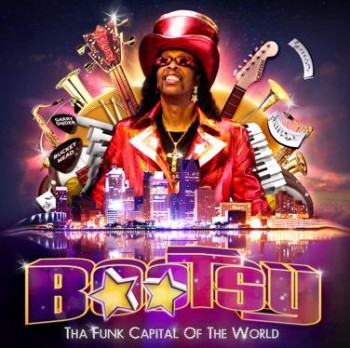
When did you take that three-year break?
1979, ‘80? That’s when I was just so out of proportion. I was so burnt out, I was tore up, man. I was a total mess between the drugs… Music wasn’t first in my life no more. I had to get high to step out the door. I was so paranoid and it became a drag. It was like, why am I here? Who am I? I was in a basement saying, wow, I gotta go upstairs and find myself. I didn’t know where I was at.
Then I just felt like I had to stop. My mother told me, if I ever got to the point where you don’t know what you’re doing or what you’re feeling, you have to stop, you have to stop everything. When I got to that point, I did.
And I was making all kinds of money, sellin’ out concerts, and everybody thought the LSD would kick back in and I was just goin’ berserk, but it wasn’t really that at all. I was just so sick and tired of me, and what I was going through, because I wasn’t feeling good about my music anymore, like my music wasn’t first anymore, and I knew it wasn’t first anymore because I had to take something to even face the world. It was not a good place, and I had to take off to try and help find myself.
A few things happened. I had a real bad motorcycle accident and the doctors told me I wasn’t going to be able to use my right arm ever again. I guess that scared me to the point that, you mean, I’m not gonna be able to play anymore? Yep, you’re not going to be able to move that arm. They had staples, nails, all this crap in my arm holding it up. So from that, after laying in that hospital bed and thinking about that, when I came out I was determined to throw my drugs away, not to ever go back to them again, and as long as I could play again that’s all I wanted to do, play and make love to the people.
But you didn’t have it at first?
I was so used to being Bootsy 27 hours a day that I didn’t know how to be William, that same guy who started at 15 years old over at King Records recording with everybody, all genres, jazz, country, R&B;, you name it. King Records did it all. That’s where I met James Brown, where my whole career really started. I had to get back to being that disciplined, accompaniment musician.
Bill Laswell, in 1983, directed me, in his own way, back to that person I needed to be. I didn’t feel like I wanted to be the target anymore. I didn’t want to be the star that I’d become. The Frankenstein monster that I’d created had turned on me. And when that mother turns on you, he goes for the throat. He really means to assassinate and get rid of you completely.
You don’t want to pre-program, oh, let’s get together at 8 o’clock tonight and have some sex, baby. Funk don’t work like that. It knows the time, it’s never incorrect, it’s always on point, and you just have to trust and believe and don’t think about it.
I wasn’t having it. It was about being whatever it took to be to get back on the one, because I had lost it. I had to find my way back and I have to credit Bill Laswell for opening the door, for letting me get back in there and letting me work with all these different musicians who challenged and inspired me. Herbie Hancock, Ryuichi Sakamoto, all these players and musicians. I got a chance to stretch out with them and vibe with them, and there was a certain element of Bootsy there, but it wasn’t me projecting it. It just felt so good getting back to music without being all drugged out, being coherent and able to laugh and have a good time and get out and touch people and connect. For me, that’s what it’s all about anyway. That’s where I came from.
So the first few times back on stage you’re not able to play and sing like you used to, and one night it just happens. Imagine that you’re explaining what that feels like to someone who’s never touched an instrument, who doesn’t have a musical bone in their body.
Wow… Let me think. Well, let me not think. What that feels like… Have you ever had sex?
[Pause] Are you asking me?
Yeah, have you ever had sex?
Yes. [Pause to consider whether this is the second lamest way to answer that question.]
Well, it’s kinda like havin’ sex in a non-standard way. Maybe a wild and crazy sex, you know? Like one minute you’re bangin it, the next minute you’re rubbin’ it, you’re trying to see if any smoke gonna come out of it. You oozin’ out your oozey, she’s oozin’ out her oozey. You lookin’ up at it. You lookin’ down at it. It’s all kind of things that the universe has to offer, and it’s all yours.
It’s like you just wallow in it. This is the moment. This is where everything was created from: between an ass and a peehole. It’s like, this is the grooviest part of living, this is where we all came from.
Then we ask, what is funk? That’s funk right there. Being born between an ass and a peehole.
Keep going with that: the universe, being receptive to it. How does one make sure they’re being open to what the universe has to offer?
First of all, you have to shut up. For a brother, that’s kind of a difficult task, to just shut up. Because we grew up on the streets and that’s part of your credibility, being able to rap your way in, rap your way out of things. This is a quality that you learn, so how do you throw that away and listen to the universe?
It took years. Years of experience going through things, failures, a little success here and there, rejection; all these things are my friend. In the beginning, I had no way of looking at these things as my friend, but all these things that I didn’t want and didn’t want to appear, kinda appeared from the universe and were here to help me, unbeknownst to me. I always thought they were against me and they were trying to destroy my life. But all the little tyrants that showed up to come and destroy my life actually helped me because I was persistent. I would not stop, I would not turn over to these little bullies, these taunts, “I’m gonna do this and that,” and my whole rap was, well, funk you.
When you say, “funk you,” that really means not, like, the other word; “funk you” really means, like, I hear what you sayin’, I understand, but I got a way that I gotta follow. When you come to me and you got a bill that needs to be paid and I can’t pay it I have to say, well, funk you right now, because you can’t get blood out of a turnip. You have to project that in a way that even the person might not even understand, but you have to continue to pursue your goal and how you feel.
I did that I accepted the love/hate thing that was going on. I accepted flying on airplanes again, which was the biggest fear I’ve ever had in my life. Once I accepted it and started doing it — see, it ain’t just about accepting, you really have to start doing and being those things you’re afraid of. Most of us are afraid of any little thing. It’s really about facing those things you’re scared of, facing that tyrant, facing that bully, facing those musical notes you have problems with, facing the teacher that you always have a problem out of and accepting them and listening to what they say because they are the authority figure. Not to say you’re going to do what they say do, but learn how to accept them for what they are and what they’re trying to teach, even if it don’t go with your program.
It took me a long time to learn that. I’m still learning. I don’t never want to learn it all because once you learn it all, you’re by yourself. You don’t never want to be caught playing with yourself.
Most of us now being taught to play with ourselves because you get a smartphone and you go in your room and you play with yourself. It’s automatic. The world is teaching us that; the world is teaching the kids that. It’s a good tool, a good device, but you don’t throw your feelings and conversations around the campfire away just because you have a smartphone. You don’t stop having group meetings and group orgies and group fun. You don’t stop being in bands and playing instruments because you can do it by yourself on your computer, because you don’t need nobody to make $3 billion, you can just sit at home and do it all by yourself. You don’t throw people off the roof because of that. It took a long time for me to learn that. If I can put a little bit of that out there by this record, that’s what I was really trying to do. Just put it down on record. Maybe a spot or two might rub off on somebody and it might connect the dots, then they’ll pick it up and carry it on. For me, if two or three people get it, that’s better than a thousand people buying the record who don’t really get it.
Stephen Reader won his fantasy basketball league this year. He’s played drums for Clean Girls and Digging Up Virgins.
Photo credit: Michael Weintrob
Syrians Face Down the Government
The Al-Jazeera live-blog from Syria is pretty incredible today. People have been protesting against the wildly corrupt government for the last four hours, facing dire stakes. The video above is from Aleppo, which is (fun fact) bigger than Damascus.
The Trouble With Awards
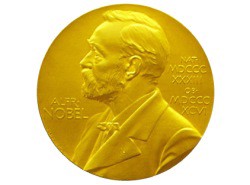
There is a certain cognitive dissonance when it comes to awards. We know that, in all but the most obvious cases where prizes are given based on predetermined metrical standards, they are entirely subjective, often political and occasionally bestowed upon their recipients for past efforts rather than any kind of current worthiness. And yet we can’t help but take sides; there is something about our brains that is hardwired to rank, to root, to want our favorite to be the winner. We even enjoy the bad calls — I know people who still bemoan the injustice of Martin Scorsese losing the Academy Award for Best Director to Kevin Costner, even though it happened 700 years ago. It is the same reason we focus on the horse race aspect of politics rather than making it about the substantial issues at stake; we prefer embracing the thrill of the contest to doing the hard work of focusing on where the merit truly lies. One could even argue that awards expose the hollowness of our society, displaying a heartless atavism which contends that winning is the only thing that matters. I object to this philosophy: Works of art, or literature or any other creative effort upon which baubles are bestowed should not be compared to one another as if they were so many different kinds of cola in some commercial taste test; they are individual feats of humanity that express something noble and profound about who we are and how we attempt to understand our world. That said, if Pippa Middleton’s ass does not win the 2011 Rear of the Year Award — Britain’s most coveted prize — I am gonna be pissed.
Random Axe, "The Hex" And 13 Other Songs About Voodoo, Juju, Mojo And Witchcraft
The video for this song from Duck Down Records’ indie-rap supergroup Random Axe is good looking but sort of confusing. It takes place in a hotel, where, in one room, rapper Guilty Simpson keeps a man tied to a bed while he builds a Rube Goldberg machine with which to kill him (kind of like if OK Go were James Bond villains.) Next door, Sean Price makes anthrax powder to send to record label offices and, for some reason, decides to taste some (!) as he’s concocting it. And in another room, Black Milk, who produced the track, plays poker. The coolest thing about all of it to me is the title, “The Hex,” which places Random Axe in excellent musical company.
(Excuse me for a moment here while I say HOLY SHIT THAT WAS SO AWESOME!!!)
Should We Be Saving the Christians' Children?
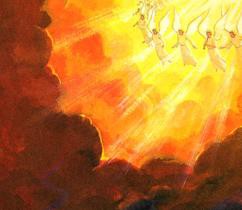
This whole “my parents think the end of the world is nigh” piece (which is pretty amazing) is really borderline on whether you should call Child Protective Services, right? I mean, when a 14-year-old is saying “I don’t really have any motivation to try to figure out what I want to do anymore because my main support line, my parents, don’t care”? Off to a friendly foster home run by heathen gays with these children!
Dear Juliette
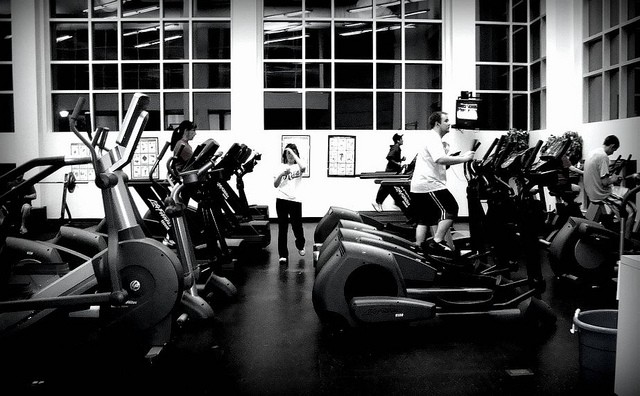
Sorry for making that obnoxious joke about the music you were listening to on your iPod.
This happened yesterday, at the gym across the street from my apartment building. I was getting ready to start jogging on one of the jogging machines and you came in and got on the machine next to me. We said hello, because we know each other from the neighborhood. From the playground, mostly, where our kids, who are about the same age, play. We only know each other a little bit, you and I. We don’t often say much more than hello. But we’re friendly towards one another, and yesterday we chatted about the fact that there were none of the hygienic wipes or paper towels that are usually available at the gym — it was Monday morning, they hadn’t been restocked after the weekend. Your machine had the sweat of a previous user on it. We joked about how it was kind of gross. There was a lot of sweat; the person must have gotten a really good work out.
Then we both put on our headphones and started listening to our iPods and I started jogging and you started walking. Then a friend of yours came in and got on another machine, one of the bike machines in front of us. I think her name is Judy? She’s the mother of another kid who plays at the playground. We both said hello to her and I wondered whether maybe my voice was too loud, since I was wearing my headphones. You can never tell.
I continued jogging, focusing my attention the Ice Cube song that I’d queued up — “Really Doe,” from the Lethal Injection album, which I’ve been listening to a lot the past week, marveling at how magnificently good Ice Cube was back in the early ’90s when it came out, he was the best in the business, and how unfairly maligned the album was at the time. “SportsCenter” was on the screen mounted on the wall in front of the jogging machines, with closed captioning.
But I could still hear what you were saying as you talked more to Judy, about your busy schedules for the day, and how you both just had time for a quick work-out. I didn’t have the iPod’s volume set too high. And maybe your voice was louder than you intended, since you were wearing earphones.
“Should I take my music off headphones?” you asked her. And you had to say it twice; she didn’t understand what you meant at first. “Should I take my headphones off the iPod so you can listen, too?”
She shook her head. She was getting out her iPhone, to email or text while she pedaled.
“Okay,” you said. And then added, “It’s just some cheesy Black Eyed Peas.”
Here, because it was such a neighborly atmosphere, I decided to make another joke. I turned my head and smiled a friendly smile and told you, “Leave it on headphones.”
Because I hate the Black Eyed Peas more than any other music act currently in existence. Because it’s likely that I hate the Black Eyed Peas more than any other music act ever in existence. (Did Hitler make any music records?) And because I know that I’m far from alone in this feeling, that it’s a pretty well-accepted thing that lots of people — especially people who are not teenagers or in their 20s — hate the Black Eyed Peas. So I figured I’d acknowledge this, as you had to a certain extent yourself, with your use of the descriptive “cheesy.” And acknowledge the sort of funniness of how you were talking to Judy but not me even though we were right next to each other, and of how we were all working out in such close proximity, but separated by the privacy afforded by each-others’ headphones, so that if you were to have taken your headphones out of your iPod, I would have been forced to listen to the Black Eyes Peas. That standard, accepted, conventional-wisdom version of modern-world hell. I knew it wasn’t a great joke I was making.
“What?” you said.
I should have taken the opportunity to just say, “Nothing,” and not repeat myself. But I explained. “If it’s the Black Eyed Peas you’re listening to,” I half shouted, starting to pant from the jogging, “Leave your headphones in.” I made my smile bigger, to let you know I was actually trying to be friendly.
“Oh,” you half-smiled. “Sorry. I didn’t realize you could hear me.”
It was no big deal, obviously. I kept jogging, you kept walking, both of us with our headphones on. Judy pedaled on the bike machine and typed on her iPhone.
But then I got to thinking that that wasn’t a very nice thing of me to say. Even as just a joke, even with a friendly smile on my face. Yes, you had described the Black Eyed Peas as cheesy; I was in a sense following your lead. But you were in fact listening to them. Enjoying them, I suppose, somehow, or else why not press fast forward? As much as I hate them, who am I to deride your choice in workout soundtrack? I’m not the taste police. And I wouldn’t want to be. That’s an ugly, snobbish role to assume. Not that I don’t have some snobbish opinions about music. I do. Like lots of people do. But I should do a better job of keeping them to myself in certain situations. Like when I’m talking to someone I don’t know very well at the gym. What if you had inadvertently seen the digital display on the screen on my iPod and volunteered your belief that Lethal Injection was the album at which point Cube fell off? (Pretty standard conventional wisdom in its own right.) What if you’d implied that it was in fact a form of noise pollution? I don’t think I would have liked that very much. You know, don’t yuck my yum.
Also, sometimes, when I’m listening to my iPod on the jogging machine at the gym, I have trouble not air-drumming or otherwise gesticulating to the really good parts of whatever song is on. Like Brad Pitt in Burn After Reading. I catch myself sometimes and realize how ridiculous I must look. So I really shouldn’t say anything to anybody ever.
Photo by Shane Malachowski, from Flickr.
See You Tonight in LA, at Book Soup and the Parlour Room!
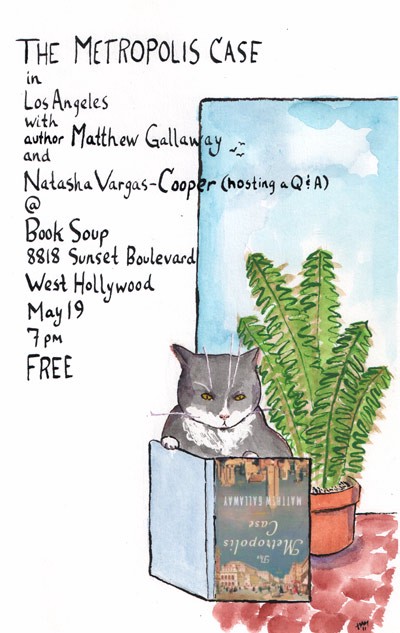
Tonight! Unless you’re going to The Hairpin’s drink session tonight in New York, then you must be in Los Angeles, because no one lives anywhere else, and so good news!
• 7:00p.m.: Matthew Gallaway reads at Book Soup, plus a Q&A; with Natasha Vargas-Cooper, 8818 Sunset, West Hollywood.
• After, like, 8:30 or so: Drinks with friends at the Parlour Room, 6423 Yucca St., Hollywood. (It’s only a “ten-minute drive”! That’s an LA ten minutes.) (Poster by Tully Mills!)
May 21: The Rapture Meets My 40th Birthday
by Maud Newton
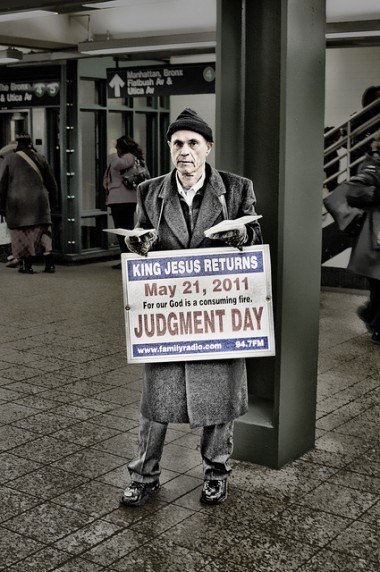
As lead-ups to fortieth birthdays go, I recommend steering clear of subway preachers who forecast the Rapture for the very day you’re most dreading. For 18 months now, End-Timers have been gathering daily, at the top of the stairway to the train I take home from work, to press “Judgment Day” tracts on unsuspecting commuters. I’m sure someone else, someone who lacked my fundamentalist baggage, would’ve laughed at the coincidence and shaken it off, but to me it felt personal when the men turned up there, with their pamphlets and placards and dire predictions, as though the God I grew up fearing and eventually turned my back on had orchestrated some final absurd cosmic joke. Of all the dates in all the centuries over more than two millennia, why May 21, 2011?
My mother, a former preacher, would call it a warning. She may not have her own church anymore, but she still believes the Second Coming is nigh. She may, in fact, actually expect to be whisked off to heaven on my birthday. I’m not going to ask. After a six-year break from each other (it’s complicated), we get along really well now that we don’t argue about God anymore; when she alludes to Him or anything else I don’t want to talk about, I change the subject. I’m an increasingly fervent agnostic, if there can be such a thing: compulsively uncertain, committed to doubt. I don’t believe in any deity — and certainly not the Christian one, whose unfairness and sadism are so repellent that even if He did exist I would gladly forgo His company to burn in hell with people I actually like.
The tedium of heaven is obvious, I know, and, having been so roundly mocked by so many, barely merits further remarking upon, but my grandmother, my mom’s mom, once had a near-death experience, dreamed of a lavish mansion reserved for her in heaven and awoke cursing at the prospect of spending eternity there. Is it possible to imagine a more dismal place than one where there is no sex and no joking and everyone sings all the time?
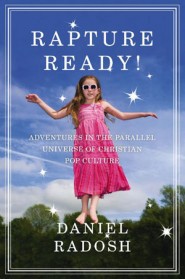
A confession, one sure to enrage fervid atheists: though I don’t expect the End of the World to be set in motion this Saturday night, I wouldn’t be entirely surprised if it were. Fatalism comes easy when you grew up bracing for the apocalypse, being told that that, sometime very soon, probably next year but possibly tomorrow morning, a fiery mountain would fall into the sea, the oceans would turn to blood and then the moon would, and soon after that a third of all living things on the earth would die. Never mind homework, forget the boy you had a crush on, it would be best to turn down the lead role in the school musical, for there was no time to waste. Jesus could return at any moment, that was the crucial thing, and it was our duty to spread the word. Also, to repent, because if you hadn’t been forgiven for every sin you’d ever committed, no matter how tiny, even if you didn’t know it was a sin, you’d be regrettably yet decisively Left Behind. Rapture Readiness is a hilarious cliche in the popular culture now, but it’s no joke when you live it. I can’t tell you how many nights I lay awake, obsessively begging the Lord for forgiveness, at the age of eight.
You get steeped in this stuff as a kid, even if some part of you was always skeptical, it’s hard to lose the residual sense that everything unfolding in the world — from natural disasters to commerce and geopolitics — signals some approaching doomsday. Or maybe this sort of existential dread is actually just genetic. It seems to run in my mom’s family.
***
Perhaps you’re gearing up to spend May 21 at a Rapture party or gassing up your car for some post-Rapture looting. Some of you may even expect to end the night seated at the right hand of God. I intend to be touring the bars of Provincetown — “an absolute sink of corruption,” my friend Joan assures me — drunk as a clam at high tide, when the hour arrives.
Obviously, given that it coincides with my fortieth, I’ll have much more on my mind than Jesus’ failure to return. The withering of my body, the decline of my intellect (such as it is), and the rapid approach of the grave, not to mention my continued failure to finish, to my satisfaction, the last two chapters of this godforsaken book I’m writing. Just to offer some highlights.
Compared to the hardcore Rapturites, though, I’m in pretty good shape. Did you hear the interviews on NPR last weekend? “It broke my heart,” my friend D.E. said in email. “There was this one couple with a baby and one on the way and they’d pretty much spent their last dime. You have to just hear the voices of these people. They’re totally lost.” She’s right, it’s tragic.
The architect of this particular Rapture scare is Harold Camping, a former engineer who claims to have found numerical clues in the Bible. He “first predicted the end would come Sept. 6, 1994” but now contends that, as of that date, he simply “had not completed his biblical research. ‘For example, I at that time had not gone through the Book of Jeremiah,’ he explains, ‘which is a big book in the Bible that has a whole lot to say about the end of the world.’” On his blog, Camping writes: “Many of you have contacted me to ask what I will do on May 22, after the May 21 Judgement [sic] Day. I’ve been asked what I will do with my things, and if I will give them away to those who write an entire one line email to me. After the May 21 Rapture, many of us will no longer be here, but this blog will live on. I have scheduled new posts to come out between May 21st and October 21st 2011, that will help those dealing with the End Times of the Apocalypse. [Emphasis mine.] If you do not think you will be saved in the May 21 Judgement [sic] Day Rapture, then please bookmark this page now to visit on May 22.” “Now that’s service,” D.E. said.
“If I’m here on May 22, and I wake up,” Camping told NPR, “I’m going to be in hell.” My favorite rejoinder to his predictions? “After He stood me up on September 6, 1994? He could’ve at least called!”
***
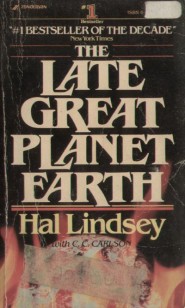
An unusual aspect of Camping’s Judgment Day catechism is that, like the Puritans’ and the Presbyterians’, but unlike most evangelicals’, it rests on the notion of predestination — that some people, the elect, are chosen by God for salvation, while the rest will perish. I say “unusual” because Rapture-readiness scaremongering originated with Hal Lindsey’s bestselling 1970 book The Late Great Planet Earth, which is decidedly not a predestination text. Lindsey, like the Methodists and the Baptists and the Pentecostals, is a big-tent guy. If you ask Jesus to forgive your sins and invite Him into your heart, under the Lindsey doctrine you are guaranteed salvation. This openness, with its emphasis on God’s endless capacity to forgive, has been the emerging trend in Protestantism, so it’s a little surprising to see Camping’s date — and far more restrictive vision of Eternal Life — getting so much attention.
For his part, on his own website, Lindsey — who once wrote, “the decade of the 1980s could very well be the last decade of history as we know it” — offers the following wisdom: “I want all of my friends to know that I AM AGAINST any form of predicting a specific day that the end of this age and the Rapture will occur. I am well aware that a Christian teacher has predicted that the end of this age will occur on May 21st 2011. When this fails, it will be used by our enemies to discredit the expectation that the Rapture could take place at any-moment.”
All of which is to say that the End Times fables of fundamentalist Protestants are multitudinous and fractious; minor denominations have actually splintered over them. A popular wall poster in the 1980s — one forever selling out of stock and being reordered at my mother’s storefront church/bookstore — depicted cars and planes crashing as their righteous drivers rose, ethereal and glowing, into the sky. Jesus would whisk the believers up to Heaven, my mother explained, and the heathens remaining would have to endure not just the aftermath of a million fiery collisions but the rest of the Tribulation. You could still be saved if you weren’t Raptured up, but it would be difficult. I’d go over the details, but it seems wrong to lead you any further into this doctrinal thicket.
Suffice it to say that there are a thousand iterations, at least, of the Rapture story, each with its own creative, deeply punitive twist. If you’re looking for confirmation in the plain language of the scriptures, however, you won’t find much. John Nelson Darby invented the pre-tribulation Rapture doctrine in the 19th century by stitching together verses from various parts of the Bible.
Mark Twain once wrote about the trouble he had gathering material for his childhood biography of Satan. “There were only five or six [facts],” he recalled. “You could set them all down on a visiting-card.” With the help of his Sunday school teacher, “on fifteen hundred other pieces of paper we set down the ‘conjectures,’ and ‘suppositions,’ and ‘maybes,’ and ‘perhapses,’ and ‘doubtlesses,’ and ‘rumors,’ and ‘guesses,’ and ‘probabilities,’ and ‘likelihoods,’ and ‘we are permitted to thinks,’ and ‘we are warranted in believings,’ and ‘might have beens,’ and ‘could have beens,’ and ‘must have beens,’ and ‘unquestionablys,’ and ‘without a shadow of doubts.’” Predictions of the impending apocalypse have about the same level of textual support. “What God lacks is convictions — stability of character,” Twain quipped. “He ought to be a Presbyterian or a Catholic or something — not try to be everything.”
***
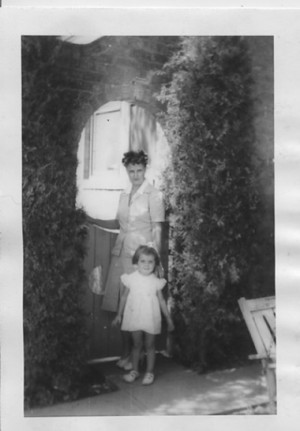
My mother was raised an atheist by an atheist Texan mother who herself had a stridently atheist Texan father. As far as I know, Mom remained contentedly godless through college. When I was three or four, she and my dad became Presbyterians, but she soon started reading the Bible for herself and questioning the catechism and she ultimately left the flock in fury over predestination after the minister told the parents of a boy killed by a speeding car that his death had been God’s will. My parents’ attempts to compromise on other denominations didn’t go so well; Mom argued with the pastors and the Sunday school teachers; the Baptists actually asked us to leave. Soon she had her own Bible study, and was speaking in tongues and laying hands on the sick and casting out demons, and eventually, first in our living room and finally in a warehouse, she had her own church. People were scandalized; a woman preaching was an aggressive act.
What’s most remarkable to me now about her sudden religiosity is that the zeal and the leadership impulses that seemed in my childhood to spring up out of nowhere have forerunners she was barely, if at all, aware of. One of her grandmothers was a “devoted Pentecostal ‘holy roller’” (my mother’s words) who not only donated her son’s insurance proceeds (from an accident that left him a paraplegic) to the church but, at some point at least, actually lived in it. Mom knew this growing up, but vaguely; her dad’s family was something of an abstraction. Then, a few years ago, long after her own place of worship was shuttered, she learned that her maternal grandmother’s sister and niece had joined together and “voluntarily started and pastored the only church in Stockard for many years until they finally got a man to come in from somewhere and take over.”
Okay, it’s not as if religious fervor was scarce in 20th-Century Texas. But recently I discovered that Mary Bliss Parsons, my ninth great-grandmother and my mom’s eighth, beat witchcraft charges — twice — in Northampton, Massachusetts, where her husband Joseph moved the family because Mary couldn’t get along with the people of Springfield. She was beautiful and opinionated, with a “harsh,” “often accusatory” manner, and she was given to “fits” that incited Joseph to lock her in the basement. According to the authors of Entertaining Satan: Witchcraft and the Culture of Early New England:
She and her husband were frequently and notoriously at odds with one another. During part of their time at Springfield he had sought to confine her to their house. (Otherwise, he said, “she would go out in the night … and when she went out a woman went with her and came in with her.”) When this tactic failed, he locked her in the basement. It was then, she claimed later on, that she had first encountered her “spirits.” There was at least one quite public episode — again at Springfield — that amounted to a family free-for-all. Joseph was “beating one of his little children, for losing its shoe,” when Mary came running “to save it, because she had beaten it before as she said.” Whereupon Joseph thrust her away, and the two of them continued to struggle until he “had in a sort beaten [her].”
Witchcraft accusations surfaced soon after the family settled in Northampton. Mary gave birth to a healthy baby boy — her fifth child — and the following year a neighbor’s newborn died. When the grieving mother claimed Mary had cursed the baby, Joseph tried to protect the family’s good(?) name by going on the offensive. No stranger to the courtroom, he initiated a defamation suit against the neighbor who’d started the rumors. This approach was tricky, and fraught; while the “immediate outcome of [slander] actions was usually favorable to the plaintiff,” the “long-range effects were mixed.”
Sure enough, Joseph prevailed, but suspicion and ill-feeling roiled until new witchcraft claims landed Mary in court again 18 years later. This time she was the defendant. Most of the evidence from the criminal trial has been lost, but the indictment remains:
Mary Parsons, the wife of Joseph Parsons, … being instigated by the Devil, hath … entered into familiarity with the Devil, and committed several acts of witchcraft on the person or persons of one or more.
Ultimately the jury acquitted her, but Mary’s case is seen as a precursor to the Salem Witch Hysteria of 1692.
It’s interesting, to me at least, to ponder the parallels between her story and my mother’s life. Both women were difficult and nonconforming and, by some accounts, mad; both purported to encounter spirits; both were accused of Devil Worship. When I was a child, the Presbyterians and Baptists all but called Mom a Satanist as they showed us the door. The legacy of loudmouthed, intractable women might run back in the other direction, too. By all accounts Mary’s mother Margaret was prickly and litigious, a force among Puritans.
I can’t speak for the rest of the gene pool, but the women in my branch of Mary’s tree are basically all, in different ways, misfits. Eccentricities and diagnosable mental illnesses vary, but the common theme is an unwillingness to bend to the expectations of polite society, a.k.a. a need to pursue our weird interests and passions whenever, wherever, and however we want.
***
When my incomparable stepdaughter, now 17, was visiting recently, I told her how pathetic I always found it at her age when adults would say, “Can you believe I’m 40? I don’t feel 40! I still feel 22!” And I would look at their eye wrinkles and their dull hair and mom jeans and I would think, Well, you sure do look 40, so suck it up. Jeez. Knowing how obnoxious I was to my mother in my teenage years, I wouldn’t be surprised if I actually said those words to her. I said far worse, that I do know.
Obviously I don’t think 40 is the end of the road — some of my favorite people are closer to twice that. It’s just that some of us age more naturally, more gracefully, more normally than others. I think a lot these days about the fact that I haven’t had children; it’s not that I regret the decision, just that it sets me apart, defines me in some way I’m not sure I was prepared to commit to. I’m a reluctant New Yorker, a loving but irregular wife, a refugee from the practice of law, a blogger who’s lost interest in regular blogging, a critic who never planned to be one and a supposed writer who’s only now finishing her first novel. What the hell, in other words, am I doing with my life?
Before my mom turned 70 last June, we had gone six years without speaking. When I called to wish her a happy birthday, though, we started talking and didn’t want to stop. Her passions are as extreme and unpredictable as always, and sometimes have unfortunate consequences — she sleeps with a shower curtain between her sheets and bedspread so that she doesn’t have to get up in the night if one of her ten dogs has an accident — but they are never boring.
Mom has been a cat hoarder, a bird breeder, a dog rescuer and, of course, a preacher. Nowadays she has turned her attention to fruit trees. My stepfather jokes that she confuses them with sofas because she’s always wanting him to uproot them and move them around. She has 20 apple trees, four apricot, five nectarine, six peach, three cherry, one mulberry, five pear (of four varieties), one plum, a dwarf lemon or two, and four or five elderberry bushes. No doubt this is a sad statement on what one finds interesting at midlife, but I love to hear her talk about them. In fact, at first, my joy at being back in touch with her was so extreme that I would often sit at my computer for the duration of our conversations, quietly typing up everything she said.
“I hit the jackpot last year, as I usually do,” Mom told me last summer. “I went to Kmart in, oh, I guess May or June, and I spied these wonderful dwarf trees that grow to be about six or seven feet tall. They were $50 apiece. I wasn’t about to pay that, but I kept looking at them and looking at them, and they didn’t sell any, so they marked them down to $25, and I bought three, and then they went to $18 and I bought three more, and then they eventually dropped down to $8 and I bought the rest. They don’t give you as much fruit as a great big tree would, but you can’t get the fruit up at the top of a great big tree.” Later, the unseasonable heat had her worried. “I have a whole bunch of grapes. I’ve got thousands of grapes out there, but the leaves that shelter the grapes from the sun are starting to look kind of brown and downcast.” Downcast leaves! This is the way she speaks, bluntly, rhythmically, sometimes poetically. I needed the time away from her, but I also really missed her.
So, does my mother expect to be Raptured up on my fortieth birthday? Does she see me as her wayward lamb, a child out of touch with Jesus who will be Left Behind to endure the Tribulation? Is she, even now, jarring and canning food so that my sister and I will have plenty of pickles, prunes and jams if we can make it down to her house in the midst of the apocalypse? I don’t know.
I do know that she has 40 fruit trees, is obsessed with demons, lives in surroundings more characteristic of Hoarders than Good Housekeeping, is completely self-reliant and seems remarkably happy. Whatever else she is, my mother is living proof that getting older doesn’t predestine anything. And on May 22, 2011, when I awake in Cape Cod with a colossal hangover, all the wrinkles on my face cast into full relief by dehydration, I’m sure that will serve, if not as inspiration exactly, as some sort of consolation.
Maud Newton is a writer and critic best known for her blog, where she has written about books since 2002.
Photo by [mementosis], via Flickr.
